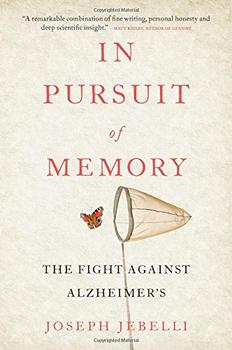Summary | Excerpt | Reviews | Beyond the Book | Readalikes | Genres & Themes | Author Bio

The Fight Against Alzheimer's
by Joseph Jebelli
Cicero, the Roman philosopher, was among the most vital advocates in this regard. He thought dementia affected 'only those who are weak in spirit and will'. A misguided theory of course, but it was the first whisper of the notion that dementia is not an inevitable product of old age. He took things further by suggesting that exercise might even prevent such decline, which was highly progressive given what I discuss later in this book. Building on his work, the Greek physician Aelius Galenus, better known as Galen, continued to buck conventional wisdom by describing patients suffering from what he called morosis (mental slowness), elderly people whose 'knowledge of letters and arts are totally obliterated. Indeed, they can't even remember their own names.' Galen shattered the ancient, irrational views his predecessors had created, recasting dementia as a medical problem worthy of deeper investigation.
However, the period that followed was almost disastrous. The Middle Ages saw a return to supernatural explanations for disease–dementia was a test of faith, a devil to be exorcised, a 'consequence of the original sin', and many sufferers were branded as witches. Even so, Christian-Judaeo beliefs also inspired a great deal of humanitarian thinking in the more enlightened. Brain diseases were looked upon with compassion and the care of the mentally ill became a religious obligation. Rational therapies, such as diets, baths and herbal medicines, came into practice: salad greens, barley water and milk, for example, were encouraged to replace red meat and wine; others endorsed a blend of aloes, black hellebore and colocynth.
When the Enlightenment began, a string of discoveries in physics, chemistry and medicine–by Isaac Newton, Joseph Priestley, John Dalton, Luigi Galvani, Alessandro Volta and Edward Jenner–pointed towards the possibility of physical explanations for mental phenomena. The French philosopher René Descartes thought that experiences make tiny pores in the brain like needles making a pattern of holes in a linen cloth. David Hartley, the eighteenth-century English physician, claimed that nerve vibrations create sensations and memory, and that violent vibrations are the cause of mental illness. These ideas were vague and incomplete, but they were free of mysticism and the supernatural.
A tipping point arrived when the French psychiatrist Philippe Pinel became the first to separate discrete types of mental disorders from the broad-brush label of insanity; it was not good enough, he said, to call these patients 'mad'. At the Bicêtre Hospital in Paris, Pinel called for compassion and non-violence when caring for the mentally ill. He spent hours talking to his patients and insisted that they be unshackled from their iron chains. Driven to study mental illness after the suicide of a close friend, Pinel used the term 'dementia' (démence, 'out of one's mind') in 1797, ushering in the modern age of psychiatry. In 1838 his most talented student, Jean-Étienne Esquirol, fiercely denounced any remaining stigma: 'A demented man has lost the goods he used to enjoy; he is a wealthy person turned poor. An idiot, by contrast, has always been unfortunate and poor.'
Twenty-six years later, on 14 June 1864, Alois Alzheimer was born.
Alzheimer grew up in the small Bavarian town of Marktbreit, a place of fairy-tale houses and cobblestone streets, Roman castles and Catholic jurisprudence. His father, Eduard Alzheimer, was a lawyer who had lost his first wife to puerperal fever. After a year of grieving Eduard married her sister, Theresia, and the couple had six children together. Alois was the eldest.
In 1883, aged nineteen, he was the first in his family to apply to medical school and obtained a place at the University of Berlin, where the world's brightest medical minds were already making history. It had been there, in 1858, that the humble-looking polymath Rudolf Virchow made great leaps in our understanding of basic biology. Virchow argued that cells, the basic structural unit of all organisms, were the roots of all disease. 'The body,' he wrote, 'is a cell state in which every cell is a citizen. Disease is merely the conflict of the citizens of the state brought about by the action of external forces.'
Excerpted from In Pursuit of Memory by Joseph Jebelli. Copyright © 2017 by Joseph Jebelli. Excerpted by permission of Little Brown & Company. All rights reserved. No part of this excerpt may be reproduced or reprinted without permission in writing from the publisher.
Never doubt that a small group of thoughtful, committed people can change the world...
Click Here to find out who said this, as well as discovering other famous literary quotes!
Your guide toexceptional books
BookBrowse seeks out and recommends the best in contemporary fiction and nonfiction—books that not only engage and entertain but also deepen our understanding of ourselves and the world around us.